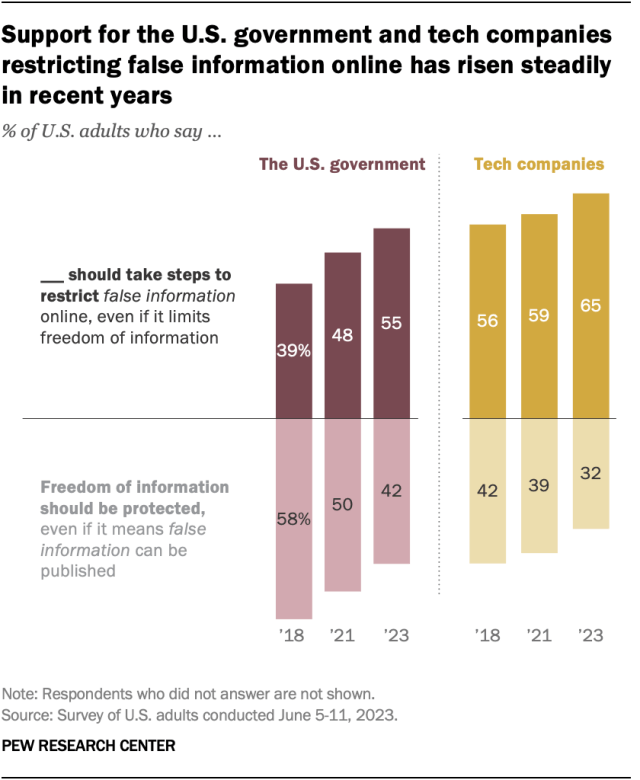Striking findings from 2023

Pew Research Center has gathered data around some of this year's defining news stories, from 
In 2021, the demographic groups most likely not to have ever been married by age 40 include men, Black Americans and those without a four-year college degree.

The rise in concern about AI has taken place alongside growing public awareness of the technology. Nine-in-ten adults say they have heard either a lot (33%) or a little (56%) about artificial intelligence. The share of those who have heard a lot is up 7 points since December 2022.
For the first time in over 30 years of public opinion polling, Americans' views of the U.S. Supreme Court are more negative than positive, 
The court's favorable rating has declined 26 percentage points since 2020, following a series of high-profile rulings on issues including affirmative action in college admissions, LGBTQ+ rights and student loans. The drop in favorability is primarily due to a decline among Democrats and Democratic-leaning independents, just 24% of whom express a favorable opinion of the court.
A growing share of U.S. adults say the federal government should take steps to restrict false information online, even if it limits freedom of information, 
The number of U.S. children and teens killed by gunfire rose 50% in just two years, according to 
Both the number and rate of children and teens killed by gunfire in 2021 were the highest since at least 1999, the earliest year for which this information is available in the CDC's mortality database.
Most Asian Americans view their ancestral homelands favorably – but not Chinese Americans, according to 
Only about four-in-ten Chinese Americans (41%) have a favorable opinion of China, while 35% have an unfavorable one. Another 22% say they have a neither favorable nor unfavorable view. This stands in contrast to how other Asian Americans view their ancestral homelands. For instance, about nine-in-ten Taiwanese and Japanese Americans have a very or somewhat favorable opinion of their place of origin, as do large majorities of Korean, Indian and Filipino Americans.
While Chinese Americans' views of China are more mixed, they still have a more favorable opinion of the country than other Asian adults do. Just 14% of other Asian Americans view China favorably.
Even before the Israel-Hamas war, Israelis had grown more skeptical of a two-state solution. In 
Among both Arabs and Jews living in Israel, there have been declines over the past decade in the share of people who believe that a peaceful coexistence between Israel and an independent Palestinian state is possible.
A majority of Americans say they would tip 15% or less for an average restaurant dining experience, including 2% who wouldn't leave a tip at all, 
Partisan views of Twitter – the social media platform now called X – have shifted over the last two years, with Republican users' views of the site growing more positive and those of Democratic users becoming more negative, 
Nearly half of U.S. workers who get paid time off don't take all the time off their employer offers, according to 
Smaller shares cite other concerns, including the feeling that taking more time off might hurt their chances for job advancement (19%) or that they might risk losing their job (16%). Some 12% say their manager or supervisor discourages them from taking time off.
An overwhelming majority of Americans (79%) express a negative sentiment when asked to describe politics in the United States these days, 
Around half of Americans (53%) say they have ever been visited by a dead family member in a dream or in another form, according to 
Women are more likely than men to report these experiences.
While the survey asked whether people have had interactions with dead relatives, it did not ask for explanations. So, we don't know whether people view these experiences as mysterious or supernatural, whether they see them as having natural or scientific causes, or some of both.
For example, the survey did not ask what respondents meant when they said they had been visited in a dream by a dead relative. Some might have meant that relatives were trying to send them messages or information from beyond the grave. Others might have had something more commonplace in mind, such as dreaming about a favorite memory of a family member.
More Americans disapprove than approve of selective colleges and universities taking race and ethnicity into account when making admissions decisions, according to 
Views differ widely by party, as well as by race and ethnicity. Around three-quarters of Republicans and Republican leaners (74%) disapprove of the practice, while 54% of Democrats and Democratic leaners approve of it.
Nearly half of Black Americans (47%) say they approve of colleges and universities considering race and ethnicity in admissions, while smaller shares of Hispanic (39%), Asian (37%) and White (29%) Americans say the same.
The share of Americans who say science has had a mostly positive effect on society has declined since 2019, before the coronavirus outbreak, 
Democrats have become much more likely than Republicans to say science has had a mostly positive impact on society (69% vs. 47%). This gap is the result of steeper declines in positive ratings among Republicans than among Democrats since 2019 (down 23 points and 8 points, respectively).
Nearly three-in-ten Americans express an unfavorable opinion of both major political parties – the highest share in at least three decades, according to 
A majority of Americans say TikTok is a threat to national security, 
Views vary by partisanship and age. Seven-in-ten Republicans and GOP leaners say TikTok is at least a minor threat to national security, compared with 53% of Democrats and Democratic leaners. Conservative Republicans are more likely than moderate or liberal Republicans – or Democrats of any ideology – to say the view the app as a major threat.
Nearly half of those ages 65 and older (46%) see TikTok as a major threat to national security, compared with a much smaller share (13%) of adults ages 18 to 29.

